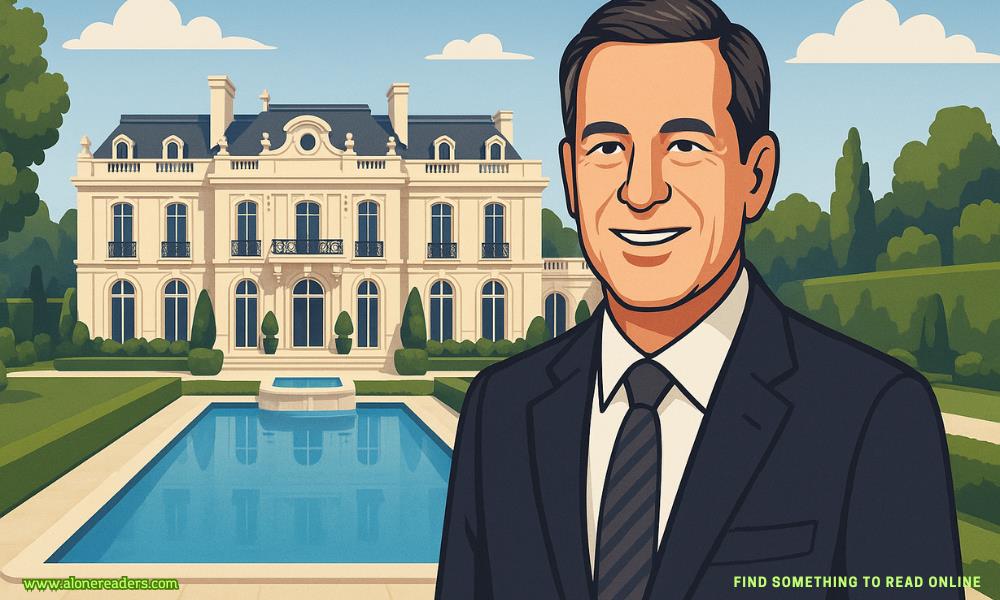Page 32 of Take Me Home
Ash lurched after Cosette, who squealed when she saw him. He scooped her up. “Hey, monkey,” he said, tickling her side. She squirmed and laughed and threw her arms around his neck.
Maggie put her hands on her hips and blew hair out of her eyes. “You’ve got this one?”
“Yeah, I’ve got this monkey.” He lowered her to the floor then tugged the pants off her head and held them open for her. While she stepped into them, he said, loud enough for his parents to hear, “Hey, Cosy, I couldn’t help but notice our house is the only one without any lights outside. Did you notice that?”
She looked out the window, then turned back, nodding gravely.
“Don’t you think we should have lights, too?”
“Yes!”
“You think I should go out there before it gets too dark and put them up?”
“Yes, yes, yes!” she sang, twirling and clapping her hands.
“All right. If that’s what you think, I trust you. I want you to come out later and inspect my work. Got it?”
She low-fived his outstretched hand hard enough to stingbefore racing across the room and launching herself into his mother’s lap. “Grandma, Uncle Ass is going to put up the lights!”
His mother hugged Cosette to her body then carried her toward the bedrooms. She held his gaze as she passed, a weariness there. “UncleAshthinks he’s pretty clever,” she said into Cosette’s damp hair in a singsongy voice, “but Grandma sees right through him.”
Chapter
Eight
After dropping off Ash, Hazel texted her father to say she was on her way. Immediately after sending the message, though, she panicked and added,Be there by dinner.
He replied,Can you pick up a few cans of soup? Doesn’t matter what kind.
Was he seriously sending her on a grocery run after she’d driven all the way here? She made him wait a few minutes before she sent a simpleK. Then, she bought a coffee and took in how different Lockett Prairie was. Entire shopping centers and manicured subdivisions where there had once been scrubby fields. A lush green golf course. A medical center, whose towers made the start of a real skyline. An AMC movie theater. The main boulevard that ran north all the way through town had been widened in places, but still the traffic was slower than ever, the sheer number of people beyond anything she remembered. It was practically a city now.
Hazel turned off her music, overwhelmed by all the new sights, a little worried she’d get herself lost. Finally, she recognized some landmarks as she reached the older part of town. Lockett Prairie High School with a new electronic marquee out front advertising the Winter Festival. The city pool. The ocean-themed Putt-Putt place where, as teenagers, her old friend, Franny Bowman, made them take the same suggestive selfieseveryone else did at the clamshell hole. The old five-dollar movie theater—closed now.
She wound up in the parking lot between the library and her old elementary school. Despite the chill, a handful of kids were running around the school playground, red-cheeked and shrieking, their parents chatting on a nearby bench. The playground was smaller than she remembered. The school, too. On cold days like this, she and Franny spent recess huddled inside the log tunnel, their backs curved against opposite sides, feet propped by the other’s face. Except on Thursdays, when Hazel went to Ms. Hatcher’s office to draw trees and cats and nod that, yes, she understood her parents’ divorce wasn’t her fault.
“I have to go see Ms. Hatcher again,” she’d complain to Franny, but she secretly loved those meetings. Ms. Hatcher gave her hot chocolate in a real, adult mug, and her office had a comfortable couch, warm lamps, a closet full of art supplies. Once they got the first part out of the way, where Ms. Hatcher asked if she had any new feelings or questions about her mom leaving, they talked about other things—her friends, school, concerns about how lockers would work in junior high. Hazel felt very grown-up, talking and sipping from her mug.
It wasn’t until an upper-level college psych course that she understood what that school counselor had really been doing—talk therapy disguised as casual conversation and play. But it made an impact. Those Thursdays in Ms. Hatcher’s office inspired Hazel to develop a volunteer program pairing struggling kids with high school mentors and led her to major in psychology and pursue her PhD. She wanted to help kids. Not in clinical practice, but more broadly, through research that would inform better interventions, programs, and frameworks.
The work she’d been doing in Sheffield’s lab hadn’t turned out to be quite so life-changing. She could see the importance oftheir study on language development in toddlers, but she’d spent all semester mindlessly transcribing audio files. All that typing felt inconsequential, the research questions not urgent enough.
Whatdidfeel urgent was Dr. Tate’s upcoming study on children separated from their incarcerated mothers. Hazel had attended Dr. Tate’s brown bag talk and followed up during her office hours with possible research questions she hadn’t been able to stop thinking about. She’d read articles on innovative family reunification programs, even studied the protocols at the women’s prison where the study would take place. Dr. Tate asked about her work with Sheffield and, after Hazel stumbled over a diplomatic answer, offered her a spot in her lab in the spring. “It may ruffle feathers,” she’d warned, “especially with him. But if it’s what you want, you have a spot with me.”
Hazel couldn’t bear another semester of transcription and Machiavellian lab politics when Dr. Tate was inviting her to do such important, hands-on research, but after busting her ass to impress Dr. Sheffield, it killed her to know he would interpret her request to switch advisors as wishy-washiness, a failure to follow through, or worse—a slap in his face. Never mind the awkwardness if he said no. She wasn’t sure she could do it.
The kids left the playground as Hazel finished her coffee. She considered how soon her father and his family would eat dinner, when she would have to make the final drive across town. A few hours yet. She wouldn’t go until she absolutely had to.
She could at least write the request to transfer, even if she wasn’t ready to send it.
Ah, there wasn’t much that was more pathetic than only facing her Sheffield problem when it delayed her from facing her father problem.
But Hazel had decided, and there was power in having aplan. She trudged into the library, found a table by the window looking out at the melancholy gray winter sky, and plugged in her laptop.
—
Hazel forgot her father’s strange request for soup until she was already driving past the last grocery store before his neighborhood. Honestly, she reasoned, if they needed soup so badly, they could probably pay someone to fetch it for them.
She knew next to nothing about her father’s fiancée, Val, only that she did a lot of philanthropy. What kind of philanthropy remained a mystery. So did her job, if she had one. Last year, out of curiosity, Hazel had looked up her father’s new address, and the Google Maps street view revealed a modest mansion. Her father made decent money now that he was the lead weather reporter at his station, but not that kind of money. Hazel had come to think of Val as a rich, Stepford wife type—beautiful, blonde, and Botoxed. A divorcée whose money came from some oil baron ex-husband, maybe. She’d probably met Hazel’s father at a black-tie event in Midland and been drawn in by his minor celebrity status, his camera-ready smile.
- Bought & Bred By the Bratva by Imani Jay
- Bratva Daddies for the Single Mom by Lisa Cullen
- Trapped By the Bratva by Ava Gray
- Freak by Vivian Mae
- Her Dom's Secret Past by Suzy Shearer
- Honey Trapped by Glenna Maynard
- Crossed Wires: The Complete Series by Mari Carr
- Bound By the Bratva by Ariana Cooper
- A Cage of Magic and Darkness by Marissa Farrar
- Enjoying the Ride by Cassandra Dee
- The Spring in My Heart by J.L. Lora
- Shattered Promise by Penelope Black
- Blood Queen by K. Larsen
- All of You by K. Larsen
- Tangled Souls by Ember Davis
- Obsessive Love by Aubry J.







